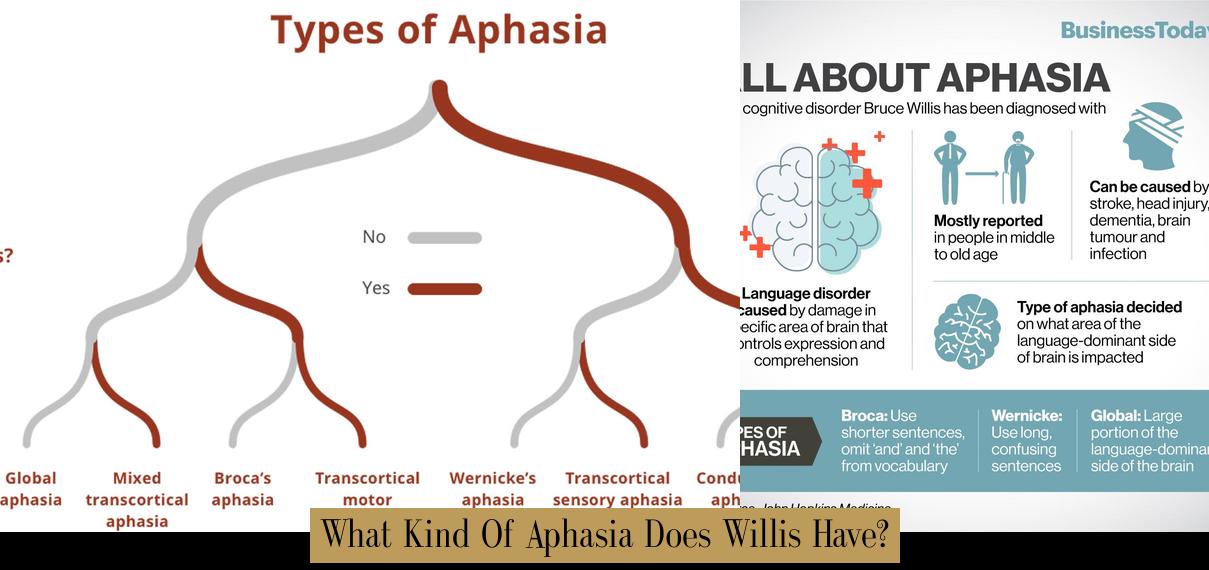What Kind of Aphasia Does Willis Have? Unraveling the Enigma of a Hollywood Icon’s Struggle
Ah, Bruce Willis. The Die Hard hero, the Moonlighting charmer, the man who made us all want to say “Yippee-ki-yay!” with reckless abandon. But in recent years, a different kind of narrative has emerged, one that focuses on a silent struggle, a battle against the very fabric of language itself: aphasia.
So, what exactly is this mysterious condition that has impacted Bruce Willis’s life, a condition that’s as baffling as a bad movie plot twist? Well, buckle up, folks, because we’re about to dive into the world of aphasia, a world where words can become elusive, and communication can feel like a frustratingly tangled web.
The Unveiling of Primary Progressive Aphasia (PPA)
To answer the question directly, Bruce Willis has been diagnosed with primary progressive aphasia (PPA). It’s kind of like the villain in this story, slowly stealing away his ability to speak, write, and even understand language. Think of it as a linguistic Trojan horse, silently infiltrating the fortress of his brain, causing havoc along the way.
Now, let’s break down what makes PPA so unique, and why it’s not just another run-of-the-mill language disorder. It’s part of a larger family of brain disorders called frontotemporal degeneration, essentially a fancy way of saying that the front and temporal lobes of the brain—the areas responsible for language, behavior, and personality—are gradually degrading.
PPA: The Silent Thief of Words
PPA is a sneaky little devil, often appearing before age 65, slowly but surely eroding the ability to communicate. It’s not like a sudden stroke that leaves you speechless; it’s a gradual, insidious decline that can be frustrating for both the individual and their loved ones. Imagine struggling to find the right word, the right phrase, the right way to express yourself, all while knowing that the words are just out of reach, like a distant echo in your own mind.
The Progression of the Disease – A Journey Through Lost Words
The journey with PPA can be a challenging one. It starts with subtle changes, like difficulty finding the right word, or struggling to understand complex sentences. As the condition progresses, the symptoms worsen, leading to:
- Lost Words: It’s as if the dictionary is getting smaller, with less and less access to the words we use to communicate.
- Fumbled Phrases: Sentences become fragmented, like a puzzle with missing pieces, making it tough to grasp the intended meaning.
- Writing Challenges: Putting thoughts down on paper, once effortless, becomes a Herculean task, as the flow of language falters.
- Understanding Breakdown: Even hearing or reading simple sentences can become a struggle, as if the brain is trying to decipher a foreign language.
Beyond the Language Loss: The Cognitive Impact
PPA doesn’t stop at language. It can also affect other cognitive abilities, and in the later stages, dementia can set in, further complicating the individual’s life. It’s like a domino effect, with one problem leading to another, making it increasingly difficult to navigate daily life.
The Devastating Effects on a Hollywood Icon
Bruce Willis’s diagnosis has brought PPA to the forefront, reminding us that even the most recognizable faces can be affected by this insidious disease. It’s a stark reminder that behind the glitter and glamour of Hollywood, there are real human beings, vulnerable to the same challenges that we all face.
The Importance of Awareness
This is not just about Bruce Willis; it’s about all of us. By bringing awareness to PPA, we can help others understand this condition, encourage early diagnosis, and support those affected. It’s time to bust the stigma surrounding brain disorders, to make sure that those struggling with PPA feel heard, understood, and supported.
A Final Note of Hope
Even though there is no cure for PPA, there are ways to manage the symptoms and improve quality of life. Speech therapy, cognitive exercises, and support groups can provide tools and strategies to cope with the challenges of this condition.
So, next time you see Bruce Willis on the screen, remember that there’s more to the story than meets the eye. It’s a story of resilience, of a man fighting a silent battle, and a reminder that even when words become elusive, the human spirit can find a way to connect.
